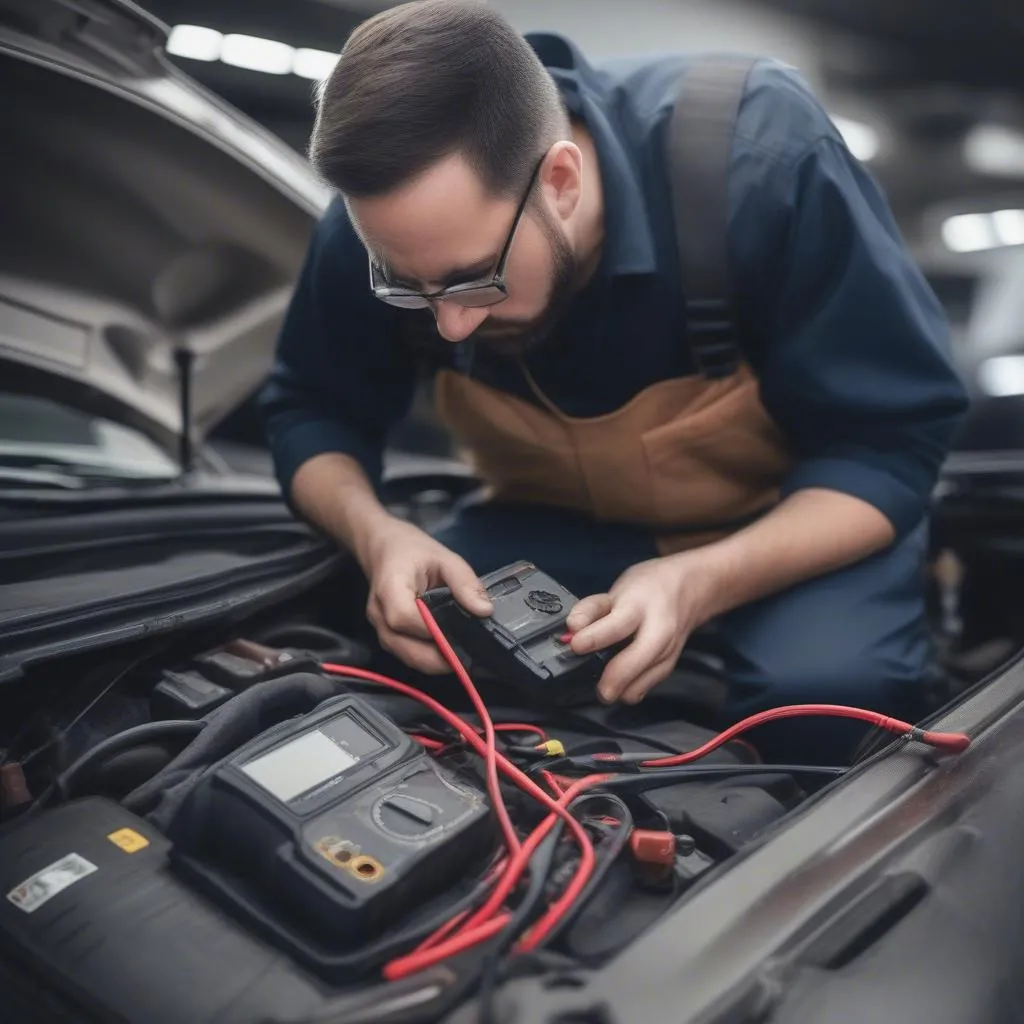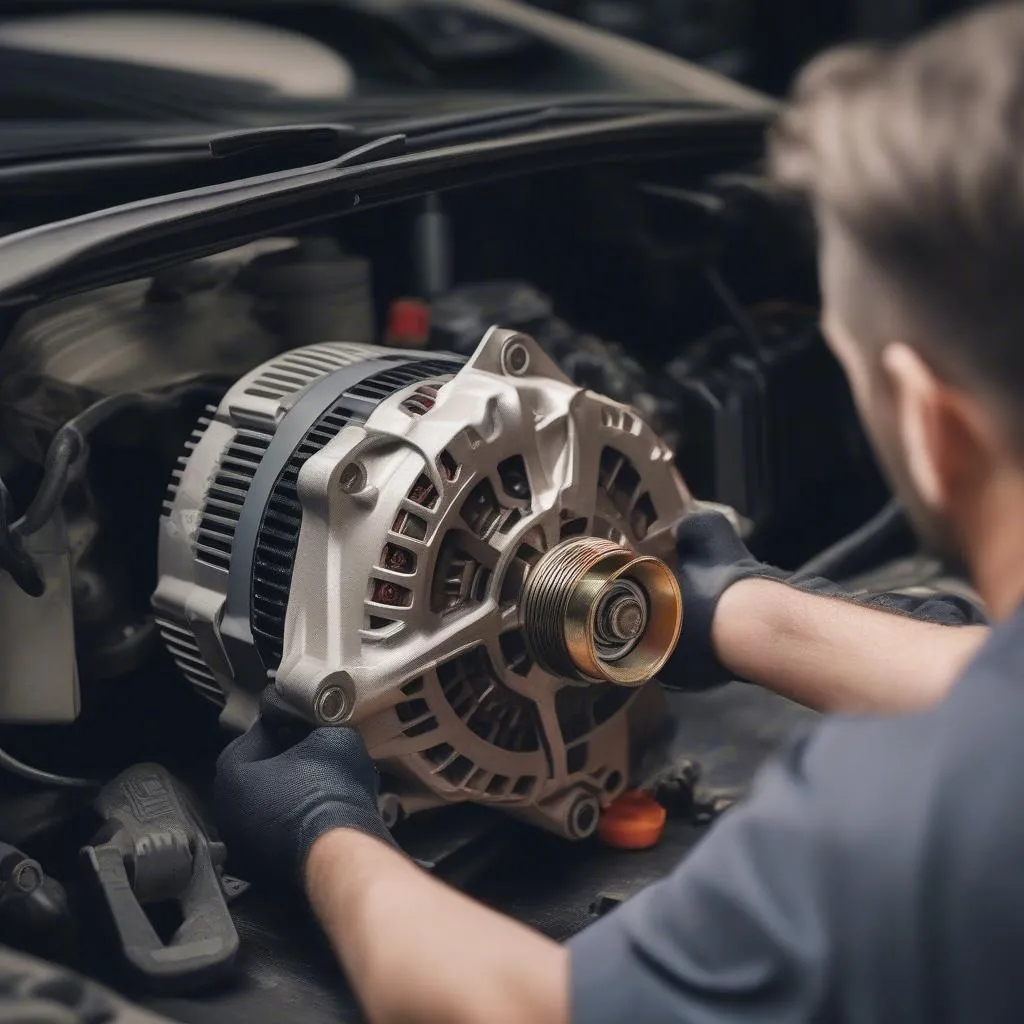Imagine this: You’re cruising down the Pacific Coast Highway, California, in your Ford Mustang, the sun is setting, and your favorite song is blasting on the radio. Suddenly, your engine sputters, your lights dim, and you coast to a stop. Your heart sinks – what could be wrong? It’s a scenario no driver wants to face, but often boils down to two culprits: the alternator or the battery. Understanding the difference between these two vital components can save you time, money, and a whole lot of roadside frustration.
Understanding the “Heart” and “Brain” of Your Car’s Electrical System
As an automotive expert specializing in European car diagnostics, I often encounter car owners struggling to grasp the difference between an alternator and a battery. Think of it this way:
- Battery: The battery is like the heart of your car’s electrical system. It provides the initial jolt of electricity needed to start your engine. Like a heart stores blood, the battery stores electrical energy, ready to be used when you turn the key.
- Alternator: The alternator is like the brain of your electrical system. Once the engine is running, the alternator takes over, generating electricity to power everything from your headlights and radio to your power windows and, most importantly, recharges the battery.
The Interplay Between Alternator and Battery
“Many people think a battery powers everything in a car,” says automotive engineer Dr. Emily Carter, author of “The Complete Car Care Guide,” “but it’s actually the alternator that keeps things running once the engine is on. The battery is there for that initial start and to act as a reserve.”
Signs of a Failing Alternator vs. a Dying Battery
Knowing the difference between alternator and battery issues can save you a tow truck call. Here’s a quick breakdown:
Alternator Issues:
- Dimming or flickering lights: This is a classic sign of a failing alternator, as it struggles to produce enough power.
- Warning lights on your dashboard: Look out for the battery warning light (often a red battery icon) or the “ALT” or “GEN” light.
- Whining or growling noises: A failing alternator might emit unusual noises from under the hood.
- Difficulty starting the car: While a dead battery can also cause this, a failing alternator might leave your battery drained, making starting difficult.
Battery Issues:
- Slow engine crank: If your engine struggles to turn over, it could signal a weak battery.
- Clicking sound when starting: That clicking you hear is the sound of your starter motor trying to draw power from a depleted battery.
- Swollen battery case: A swollen or leaking battery case is a sure sign of a bad battery and needs immediate replacement.
- Old age: Car batteries typically last 3-5 years. If yours is approaching the end of its lifespan, it’s likely the culprit.
 Car battery inspection
Car battery inspection
What Happens When One Fails?
“Think of it like this,” explains Dr. Carter, “a dead battery means your heart isn’t pumping, so you can’t even start the race. A failing alternator is like your brain not sending enough signals to your muscles – you might start running, but you’ll quickly run out of steam.”
Can I Drive With a Bad Alternator/Battery?
Driving with a bad alternator is strongly discouraged. Your car will eventually run out of electrical power, leaving you stranded. You might be able to drive a short distance with a bad battery, especially right after a jump start, but it’s risky and not a permanent solution.
 Car alternator replacement
Car alternator replacement
FAQs About Alternators and Batteries:
Q: How often should I replace my car battery?
A: On average, car batteries last 3-5 years. However, driving habits, climate, and battery quality can affect lifespan. It’s best to have your battery tested regularly by a mechanic, especially as it ages.
Q: Can I jumpstart a car with a bad alternator?
A: You can jumpstart a car with a bad alternator to get to a safe location or a mechanic, but it’s not a long-term solution.
Q: How much does it cost to replace an alternator/battery?
A: Costs vary depending on your car’s make and model and labor rates. Generally, battery replacement is cheaper than alternator replacement.
Need Expert Help?
Diagnosing and fixing car problems can be tricky. If you’re experiencing electrical issues with your car, it’s always best to consult with a qualified mechanic.
We understand that car trouble can be stressful. If you need assistance with diagnostics tools or expert advice, don’t hesitate to contact us via Whatsapp at +84767531508. Our team of automotive specialists is available 24/7 to answer your questions and provide guidance.
Keep Your Car Running Smoothly
Understanding the difference between an alternator and a battery empowers you to better care for your vehicle and avoid unexpected breakdowns. Remember, regular maintenance and timely repairs are key to a healthy and happy car.
Looking for more car care tips and advice? Check out these related articles:
- Dead Battery or Alternator?
- Signs of a Bad Car Battery vs. Alternator
- Bad Battery vs. Bad Alternator
We hope this article has been helpful in clarifying the roles of the alternator and battery in your car. Safe travels!